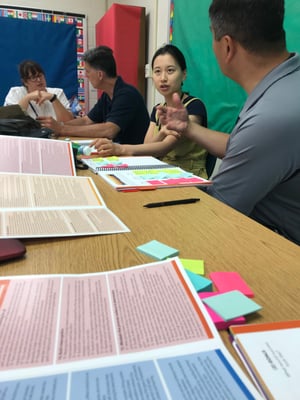Whenever I am at a conference, I always opt for the sessions that have the keyword “research-based” or “neuroscience.” Since teaching is all about building that neuron network, learning more about the related studies makes sense to me. Therefore, 5 days at CTTL, the Center for Transformative Teaching & Learning, where all sessions are backed by both experienced teachers and prestigious researchers, made me feel like a kid in a candy store.
 Even though the week-long conference was overwhelmingly rich in information, there is one repeated theme that is reassuring-- at Tabor, we are already doing most of the best practices. Teaching in multiple modalities? During the 75-minute block, it is necessary that we switch things up in order to keep everyone engaged. Making learning meaningful? We make every effort to tap into topics and stories that are relevant to the students’ lives to make learning tangible. And also building metacognition, helping students grow executive functioning… etc. These confirmed, effective techniques remind us to be more intentional with our pedagogy, and at the same time, we already share valuable learning with our students.
Even though the week-long conference was overwhelmingly rich in information, there is one repeated theme that is reassuring-- at Tabor, we are already doing most of the best practices. Teaching in multiple modalities? During the 75-minute block, it is necessary that we switch things up in order to keep everyone engaged. Making learning meaningful? We make every effort to tap into topics and stories that are relevant to the students’ lives to make learning tangible. And also building metacognition, helping students grow executive functioning… etc. These confirmed, effective techniques remind us to be more intentional with our pedagogy, and at the same time, we already share valuable learning with our students.
Through attending the deep dive and small group sessions, I have also identified my areas for improvement. One of the biggest takeaways that I would like to implement in my own classroom in the following years would be giving feedback that works. In the day-to-day boarding school routine, we sometimes get caught up in the momentum and just keep going. The same thing happens in classrooms; once we finish a chapter, we dive right into the next, forgoing the opportunity to reflect on the projects or exams we worked so hard on. At CTTL, I learned that if students don’t act on the feedback I give them, I might as well not give them any. Furthermore, the numeric grade on their paper takes away that precious opportunity to learn from their mistakes. I am eager to change the way I return student work, and the people in my group provided a great sounding board for my ideas. My group helped me narrow down my initially ambitious ideas and gave me input to flesh out an actionable plan. Now, these teammates from all around the world are my allies. Talk about networking!
In addition to changing the feedback process, I am excited to reinforce the memory skills, some of them I already do consistently, while some others I can bring to the front burner. One key message I have acquired is that students need to be actively producing in order to make the novel information stick. The teacher’s job is to create and foster that environment. Making the students sit quietly and take notes while listening to my lecture will yield very little retention. This is a great reminder that education is not about how well we teach, it is about how well they learn.
For me, a week at CTTL was not a “recharging” experience; instead, it was a “software upgrade”. It was such an exhilarating learning experience that I hope most faculty can find time to join. Not only will the conference refresh a teacher’s toolkit, it will also rekindle their enthusiasm, as they find themselves surrounded by dedicated educators who are brimming with ideas. In other words, CTTL reminded me of my purpose and gave me ways to achieve it.








